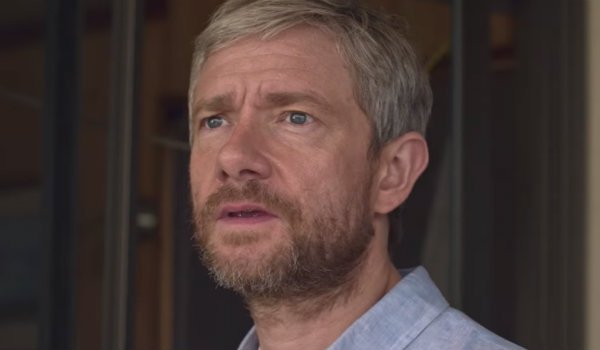The zombie corner of the horror genre has exploded over the course of the last two decades, with films like 28 Days Later... and Dawn of the Dead and TV shows like The Walking Dead taking these living corpses in some wild new directions. We've seen zombies in all shapes and sizes, so it's nice to see a film come around that strips the genre down to its basics and focuses on the human core of this monstrous world. That's what Yolanda Ramke and Ben Howling's Cargo does, and the newly-released Netflix horror-drama represents an incredibly effective (albeit very slow) portrayal of the struggles of parenthood and morality.
Essentially a longer and more fleshed out remake of their 2013 short film of the same name, Cargo is Yolanda Ramke and Ben Howling's take on a grounded and gritty zombie outbreak scenario. Set within the vast expanses of the Australian outback, we follow Andy (Martin Freeman) as he struggles to get his daughter to safety in a harsh world where anything and anyone can kill them at a moment's notice. The problem? Andy has a bite wound of his own, and he only has 48 hours to find salvation for his little girl before the virus claims him. What follows is a race against time and the elements (not to mention hordes of undead freaks) as a family man musters his remaining strength to fulfill his fatherly duties.
The first thing that needs to be said about Cargo is the fact that this is one of the less traditionally exciting zombie movies in recent memory, and that's almost entirely by design. Cargo's foundation is built upon family drama and emotional stakes more than headshots and gore, so the film relies more on a sense of dread than it does on jump scares or thrills. In that regard, Cargo has a bit more in common with the 2015 Arnold Schwarzenegger film Maggie (although it's arguably a far better movie) than it does with mainstream zombie fiction like The Walking Dead.
Ultimately, the slower pace generally works to Cargo's benefit. Andy's journey through the Australian wilderness (coupled with the continually ticking clock) provides a near-perfect backdrop to explore the inherent fears associated with parenting, and Andy's arc intentionally exhausts us as we watch one man get pushed to his absolute limits in a relatively small-scale (relative to other zombie movies) adventure. If you're tired of zombie fiction that seems that exist for no other reason than to offer up stories in which humans get torn to pieces, then this will represent a nice change of pace. In fact, there's relatively little gore in Cargo; the film seems far more concerned with its take on morality and broader questions.
Additionally, Cargo also seems to have quite a bit to say about colonization and the virtue of living a life in harmony with the natural world. Without feeling too heavy-handed, the film features several scenes in which Andy encounters members of indigenous tribes -- particularly one incredibly compelling girl named Thoomie (Simone Landers) -- and characters who represent stand-ins for white colonizers. The juxtaposition of these groups' intentions and desires ultimately meshes with Andy's personal arc incredibly well, and we're left to watch as this average man grapples with the question of the type of world that he wants to leave for his daughter. The zombie genre has long provided a way to present commentary on modern personal and social issues, and Cargo continues that tradition in a significant way.
However, on the flip side of that coin, there's an argument to be made that Cargo's Odyssey-style storytelling sometimes serves as its biggest drawback. The story inherently requires Andy to keep moving, but there are certain scenes in the film that would benefit from more attention and focus. One such sequence involves an encounter with another father in a similar situation, who doesn't seem to share Andy's sense of persistence.
Also, worth commending is Cargo's knack for world building without overextending itself. At this point in the existence of the zombie genre, audiences have become incredibly good at picking up context clues. We don't need specific pieces of exposition anymore, and Cargo wisely understands that we're smart enough to pick up on the nuances this world. Pharmaceutical items carried by characters show us how the world tried to cope with the growing threat of the undead, and the way characters talk about the possibility of rebuilding help emphasize that the planet did not fall to the zombies overnight. It's reminiscent of the early work done by the late George A. Romero in his original Night of the Living Dead, but it builds off of that work because we no longer need a constant stream of newscasts to tell us what these creatures are and how to deal with them.
Though it's as slow as the undead, Cargo is an effective horror-drama that takes a more cerebral approach to the zombie apocalypse. It won't get your pulse pounding like some other recent zombie properties, but it will get you thinking and leave you pondering your sense of family responsibility. If you're looking for a zombie movie that places less of an emphasis on gore and more of a focus on a thoughtful narrative, then this seems like the perfect blend of horror and drama for you.
Originally from Connecticut, Conner grew up in San Diego and graduated from Chapman University in 2014. He now lives in Los Angeles working in and around the entertainment industry and can mostly be found binging horror movies and chugging coffee.


